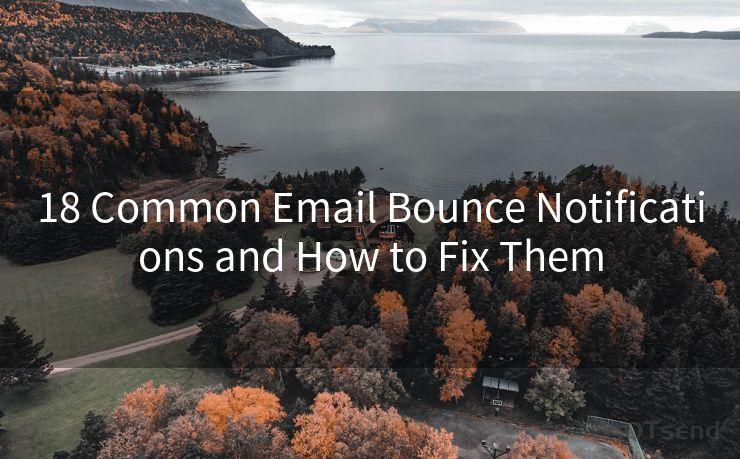18 Common Email Bounce Notifications and How to Fix Them




Email bouncing is a common occurrence that can happen due to various reasons. Understanding the different types of bounce notifications and how to fix them is crucial for maintaining a healthy email list and ensuring your messages reach their intended recipients. In this article, we'll explore 18 common email bounce notifications and provide solutions to fix them.
1. Invalid Email Address
Bounce Notification:
"550 Invalid recipient" or "550 No such user here"
Solution:
Verify the email address for typos or formatting errors. Use double opt-in methods to ensure email addresses are valid during the signup process.
2. Mailbox Full
Bounce Notification:
"552 5.2.2 Mailbox full"
Solution:
Encourage recipients to clean up their inboxes or increase their mailbox size. Consider resending the email later.
3. Message Too Large
Bounce Notification:
"552 Message size exceeds fixed limit"
Solution:
Reduce the size of your email by compressing images, removing large attachments, or splitting the content into multiple emails.
🔔🔔🔔
【AOTsend Email API】:AOTsend is a Managed Email Service for sending transactional emails. Support Email Types: reminders, authentication, confirmations, notifications, verification codes, invoices, password resets, account activations, billing statements, two-factor authentication (2FA), and one-time passwords (OTP) emails, etc. $0.28 per 1000 Emails. 99% Delivery, 98% Inbox Rate.
You might be interested in:
Why did we start the AOTsend project, Brand Story?
What is a Managed Email API, How it Works?
Best 25+ Email Marketing Platforms (Authority,Keywords&Traffic Comparison)
Best 24+ Email Marketing Service (Price, Pros&Cons Comparison)
Email APIs vs SMTP: How they Works, Any Difference?
4. Suspected Spam
Bounce Notification:
"554 5.7.1 Service unavailable; Client host [IP] blocked using Spamhaus"
Solution:
Ensure your emails comply with CAN-SPAM laws. Use a reputable email service provider and avoid spammy language or practices.
5. DNS Problem
Bounce Notification:
"451 DNS lookup failed"

Solution:
Check your DNS settings and ensure they are correctly configured. Contact your hosting provider or IT department for assistance.
6. Greylisting
Bounce Notification:
"451 4.7.1 Try again later"
Solution:
Greylisting is a temporary rejection meant to combat spam. Wait for a while and try sending the email again.
7. Connection Timeout
Bounce Notification:
"451 Connection timed out"
Solution:
Check your internet connection and try sending the email again. If the problem persists, contact your email provider.
8. Relay Denied
Bounce Notification:
"554 Relay access denied"
Solution:
Ensure you are sending emails from an authorized IP address or domain. Check your SMTP settings and authentication methods.
9-18. Other Common Bounces
Other bounce notifications may include "User unknown," "Domain not found," "Access denied," "Mailbox disabled," "Transient system failure," "Unrouteable address," "Insufficient system storage," and "Undefined error."
Solutions:
For these and other less common bounces, the solutions typically involve verifying the recipient's email address, checking your email sending practices, and ensuring compliance with email sending best practices. Additionally, keeping your email lists clean and up-to-date can help reduce bounce rates.
In conclusion, email bouncing is a common challenge, but it can be managed effectively by understanding the different types of bounce notifications and implementing the appropriate solutions. By following the tips outlined in this article, you can improve your email deliverability and ensure your messages reach their intended recipients. Remember to regularly monitor your bounce rates and take proactive measures to maintain a healthy email list.




Scan the QR code to access on your mobile device.
Copyright notice: This article is published by AotSend. Reproduction requires attribution.
Article Link:https://www.mailwot.com/p4425.html



